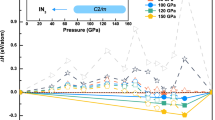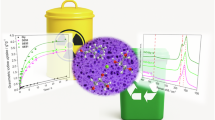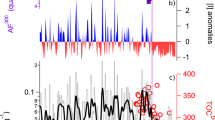Abstract
As part of an investigation undertaken in this laboratory on the emission spectra of halogens and halogen derivatives of methane1, the emission spectrum of iodine is being studied. The spectrum is excited by a high-frequency as well as a transformer discharge in iodine vapour of pressure equivalent to the saturated vapour pressure of iodine at room temperature. A Steinheil 3-prism glass spectrograph and medium Hilger quartz and constant-deviation glass spectrographs have been used as resolving instruments. Super Panchro-press P 1200 and Process Regular B 20 Kodak plates were used.
This is a preview of subscription content, access via your institution
Access options
Subscribe to this journal
Receive 51 print issues and online access
$199.00 per year
only $3.90 per issue
Buy this article
- Purchase on SpringerLink
- Instant access to the full article PDF.
USD 39.95
Prices may be subject to local taxes which are calculated during checkout
Similar content being viewed by others
References
Cf. Asundi, Singh and Mishra, Curr. Sci., 12, 204 (1943).
Cf. Curtis and Evans, Proc. Roy. Soc., A, 141, 603 (1933).
Herzberg, "Molecular Spectra", 462 (1939).
Author information
Authors and Affiliations
Rights and permissions
About this article
Cite this article
ASUNDI, R., VENKATESWARLU, P. Emission Bands of the Fluctuation Type in the Spectrum of Iodine. Nature 156, 452 (1945). https://doi.org/10.1038/156452a0
Issue date:
DOI: https://doi.org/10.1038/156452a0
This article is cited by
-
Emission bands of halogens
Proceedings of the Indian Academy of Sciences - Section A (1946)



